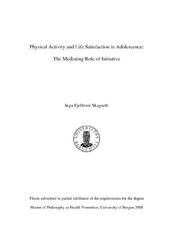| dc.description.abstract | Background: The ability to take initiative is considered an important developmental task in adolescence. Organised leisure time activities have been suggested as especially conducive contexts for initiative development. Therefore, the aim of this thesis was to investigate the relationship between leisure time physical activity, initiative, and life satisfaction in adolescence. The self-determination theory was used to identify factors that facilitate intrinsic motivation, initiative, and life satisfaction. Method: The study used data from Norwegian 15 year-olds (n = 1534, response rate 58 %) participating in the 2005/06 Health Behaviour in School-aged Children-study. Correlation analysis, two-way ANOVA's, and regression analyses were performed. Results: Organised physical activity participation was associated with higher frequency of physical activity [F (2, 1464) = 155.18, p < .001], more initiative experiences [F (2, 1370) = 139.62, p < .001], and higher life satisfaction [F (2, 1360) = 19.35, p < .001]. In addition, initiative fully mediated the relationship between physical activity and life satisfaction for girls [β reduced from .16 to .02], and partially mediated the same relationship for boys [β reduced from .24 to .12] and the entire sample [β reduced from .23 to .10]. Discussion: Organised physical activity seemed to be especially beneficial for initiative development. Learning to take initiative also appeared to be important for adolescents' general life satisfaction. A motivational climate that supports intrinsic motivation, competence-building, and social relationships was recommended, to maximise the psychosocial benefits of organised physical activity participation. | en_US |
